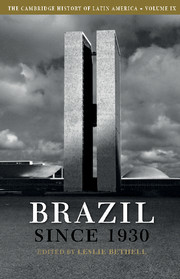Book contents
- Frontmatter
- PART ONE POLITICS
- 1 Politics in Brazil Under Vargas, 1930–1945
- 2 Politics in Brazil under the Liberal Republic, 1945–1964
- 3 Politics in Brazil Under Military Rule, 1964–1985
- 4 Politics in Brazil, 1985–2002
- PART TWO ECONOMY AND SOCIETY
- Bibliographical Essays
- Index
- THE CAMBRIDGE HISTORY OF LATIN AMERICA
- References
4 - Politics in Brazil, 1985–2002
from PART ONE - POLITICS
Published online by Cambridge University Press: 28 May 2009
- Frontmatter
- PART ONE POLITICS
- 1 Politics in Brazil Under Vargas, 1930–1945
- 2 Politics in Brazil under the Liberal Republic, 1945–1964
- 3 Politics in Brazil Under Military Rule, 1964–1985
- 4 Politics in Brazil, 1985–2002
- PART TWO ECONOMY AND SOCIETY
- Bibliographical Essays
- Index
- THE CAMBRIDGE HISTORY OF LATIN AMERICA
- References
Summary
INTRODUCTION
15 March 1985 witnessed a peaceful transition to civilian rule in Brazil (though not yet to a fully-fledged democracy) after twenty-one years of military rule. A transição pactuada was effected, the result of negotiations between the political elite and the military high command to facilitate the seamless transfer of power – sem ruptura – from the last of five successive military presidents since 1964 to a moderate, conservative civilian president acceptable to the military. However, Tancredo Neves, the politician elected, albeit indirectly elected, president in 1985 never took office because of a serious illness on the eve of his inauguration (from which he never recovered). It was the Vice-President-Elect, José Sarney, who became the first civilian president of Brazil in more than two decades.
Under the Constitution of January 1967, incorporating the various amendments to the 1946 Constitution of the Liberal Republic introduced by the military regime following the 1964 coup, presidents were indirectly elected by Congress acting as an Electoral College, in which the progovernment party, the Aliança Renovadora Nacional (ARENA), had a built-in majority and could be relied upon to vote for the military’s chosen candidate. The so-called pacote of April 1977 (a ‘package’ of measures to change the electoral rules of the game in favour of the regime) introduced an important modification: the Electoral College that elected the president would also include delegates from the state legislatures, all but one of which were also controlled by ARENA.
- Type
- Chapter
- Information
- The Cambridge History of Latin America , pp. 231 - 280Publisher: Cambridge University PressPrint publication year: 2008
References
- 2
- Cited by

